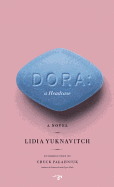
 Lidia Yuknavitch's The Chronology of Water met with stunned praise when it was published in 2011. The memoir introduced readers to a woman writing from a howling, honest, unapologetically feminine raw nerve--one who clearly knew what it is to be a messed-up, shut-down, screaming-but-silenced teenage girl.
Lidia Yuknavitch's The Chronology of Water met with stunned praise when it was published in 2011. The memoir introduced readers to a woman writing from a howling, honest, unapologetically feminine raw nerve--one who clearly knew what it is to be a messed-up, shut-down, screaming-but-silenced teenage girl.
Dora: A Headcase, Yuknavitch's first novel, comes from a similar place. It's an inside-out retelling of Sigmund Freud's classic case study of "Dora," a Viennese teenager he diagnosed with hysteria (that proverbial feminine plague) in which Yuknavitch transposes the patient to modern-day Seattle and outfits her with a shaved head, plaid miniskirt and a crew of badass, misfit friends. "You know what? Seventeen is no place to be," declares Ida, our modern-day Dora. Her family life is stressful and complicated. She acts out. She gets high. Like the first Dora, intense emotions make her faint or lose her voice.
So Ida's parents send her to Seattle's top psychotherapist: Dr. Freud, whom Ida calls Sig. She has no patience for his brand of analysis: "Hello, won't you come in and let me explore your genitals by pretending to talk about your family origins," she scoffs. "What a load of crap." Ida's first line of defense against Sig's probing is her recalcitrant wit, but she's also got a millennial's innate flair for technology---and an audio recorder stashed in her repurposed Dora the Explorer purse.
Buying Freud as a contemporary Seattle psychotherapist takes some suspension of disbelief, but otherwise you would never know that Yuknavitch was borrowing a story from early 20th-century psychology. Ida and her friends (including Obsidian, a gorgeous Native American girl whom Ida is in love with) are hyper-modern, overstimulated and misunderstood. "We live through sound and light--through our technologies," she explains. "With our parents' zombie life dope arsenal at our fingertips."
Technology and chemicals may dominate Ida's life, but she's wiser than she gets credit for. "Wanna know the difference between adult wisdom and young adult wisdom?" she asks us. "You have the ability to look back at your past and interpret it. I have the ability to look at my present and live it with my whole body."
We know the original Dora (whose real name was Ida) only filtered through Freud's predictable analysis of her feelings and dreams. But in Dora: A Headcase, Yuknavitch grants a perspective and a voice to the girl who lost both. --Hannah Calkins
Shelf Talker: Lidia Yuknavitch transposes Freud's classic case study to modern-day Seattle, giving us Dora 2.0: a funny, foul-mouthed, queer bad girl who has more to teach us than Freud ever dreamed.

